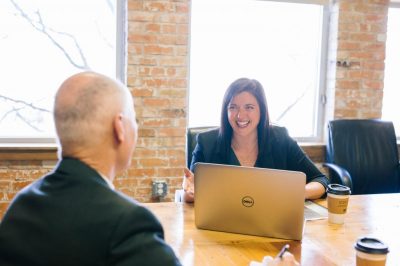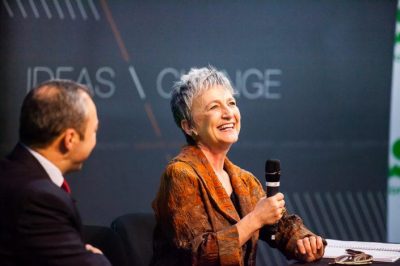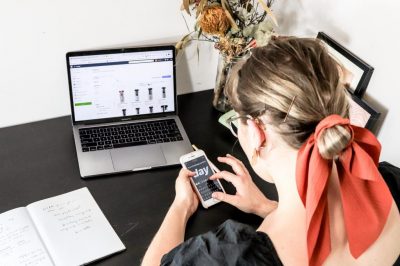A mini guide to inclusive recruitment

The following by Dana Kohava Segal is an inspirational read.
I feel like I should open this blog with a disclaimer: I’m not a recruiter. I don’t work in recruitment. I’m just a regular human who has been both an employer and an employee, someone who is surrounded by people from a huge range of backgrounds and life experiences, who is trying to make things better. I am left with the feeling that too many organisations and people in our sector still aren't doing enough to understand and implement small changes to their recruitment that make a huge difference to inclusivity. In the words of my awesome friend Martha Awojobi: “it’s not revolutionary, it’s just inclusion.”
Don’t require a degree.
There are loads of reasons including a degree is exclusionary:
For entry-level roles, it discriminates against younger applicants from lower socio-economic backgrounds. How much did you pay to go to uni? It certainly wasn’t £9,000 a year like it is now. It’s just not a feasible option for so many people and no one should be punished for making wise decisions about not getting into debt - if anything they are showing good financial acumen.
For senior roles, it discriminates against applicants who have plenty of relevant work experiences but didn’t go to uni. I know plenty of people who are great at their jobs who never went to university. In adding a degree requirement in, you might be leaving your perfect candidate out...
Some of the world’s biggest companies don’t require a degree - Google, Apple, BBC, Virgin. We need to attract talent in to our sector. We have to make it more attractive for people to work in the third sector. And this is a big part of that.
Practical actions to take:
Next time you’re writing a new job description, think twice about adding it in as a mandatory requirement. Is it really relevant? REALLY? I didn’t think so. Take it out!
If you’re updating an old one, take it out of there!
Get your colleagues to take it out!
Make it part of your organisation’s HR policy to not have it as a mandatory requirement
Use #NonGraduatesWelcome when advertising your roles on socials to let non-graduate candidates know they are welcome to apply
Reads & resources:
Non Graduates Welcome
Advertise the salary.
Gender pay gaps, ethnic pay gaps and age-related pay gaps are everywhere. People doing the same jobs, at the same level, being paid differently. That is totally unfair.
A huge part of this is the recruitment point when organisations simply say ‘competitive’ and lock candidates between a rock and a hard place: pitch too low and you undersell yourself, pitch to high and they don’t consider you.
Practical actions to take:
Put the salary or salary range on every job you advertise!
That’s literally it...
Reads & resources:
Follow @ShowTheSalary on Twitter:
ONS Statistics about ethnicity & pay gaps
Good reads that explore the challenges of gender pay gaps include Lean In by Sheryl Sandberg and Invisible Women by Caroline Criado-Perez
Give interview questions in advance.
Interestingly this is the one I’ve had the most emails/comments about. There are many discriminatory reasons for this:
Not providing any preparatory information or questions at the interview stage discriminates against neurodivergent people, who may need additional time to process tasks and questions before they are faced with them.
It also discriminates against younger candidates, candidates who have been in long stretches of unemployment, and/or candidates who are new to the job market who might not have any immediate answers to questions like ‘tell us about a time where you helped improve a system’ but with a bit of time and prep could construct a good answer.
No one can “cheat” - even if candidates make up answers, it will clearly be found out in the follow-up questions and conversation that arises.
Ultimately this boils down to whether you are in one of two ‘camps’: you are someone who believes that an interview is an opportunity for candidates to perform to the best of their abilities and then select based on that, or you see the interview as a competitive process in itself that helps you select the right candidate (i.e. that person performed better under pressure, therefore, are a more suitable candidate).
The Halo Effect is a common unconscious bias, where one trait of a person is used to make an overall judgment of that person. In this case, many people believe that how they perform at an interview tells them about their ability to do the job. Unless the job is being interviewed all day every day, it’s just not an accurate marker of this. So stop it.
Practical actions to take:
If you can, give the specific interview questions well in advance
If you can’t, give the interview questions at least 15 - 30 minutes in advance and provide a suitable, quiet space for candidates to review the questions and make notes
If you are after the ‘element of surprise’, at the absolute very least, give candidates a specific list of topics you plan to discuss in the interview
Reads & resources:
10 Reasons to Give Candidates Interview Questions In Advance
Example of a Fair Hiring Guide that includes this practice
Offer alternative options for applications and interviews.
This one comes from my recent experience of recruiting new Board members for Emergency Exit Arts.
As well as the usual “CV & cover letter” we also offered candidates the chance to apply by video instead. We got rid of complicated language and asked for people based on their qualities and values. We set up an open evening on Zoom where people who were interested in applying could meet our trustees and staff to ask questions and get to know the people behind the forms before applying.
This led us to have over 5 x the usual number of applications we normally get. Yes, many people submitted CVs & letters, but we also had videos. The applications were more diverse in age and ethnicity than ever before too. One person saw the application with 1 hour to spare, and instead of scrambling around to update her CV and write a cover letter, was thrilled that they could just record their video and send it over to us.
Similarly, with the interview processes, COVID-19 has meant that for the first time, en masse, we are all doing away with the traditional scary ‘power table & panel interview’ and literally giving everyone - employer and employee - equal space on the screen and therefore in the interview. This is a game-changer that should be here to stay.
Practical actions you can take:
Offer alternative application options (e.g. video or audio cover letters)
Offer alternative interview options (e.g. like in person or video call, with or without table, in an office or a neutral setting, sitting down or taking a stroll)
Reads & resources:
A great read from Young Trustee Bronwen Edwards about the turn off of non-inclusive recruitment practices
Four Alternatives to a Traditional Job Interview (need to register to read)
Diversify your panel.
My amazing friend Martha Awojobi, is a talented fundraiser who is a woman of colour. She has been to many interviews in her time but has never been interviewed by someone who looks like her. And she was interviewed just once by a man of colour.
I hate that this has happened to her. I hate that this happens to talented people of colour, disabled and or/ LGBTQ+ people every day. It needs to stop, and a simple way to do this is to ensure that your panel actually represents the range of candidates you want to attract.
Practical actions you can take:
Don’t have an all white / all male / all hetro / cis / all non-disabled panel
If you don’t have anyone in your organisation to stop the panel from being this way, take a long hard look at yourself…
Reads & resources:
Martha Awojobi on Fixing Fundraising Podcast
Beware the phrase ‘they seem like a good fit’.
This is entirely connected to many of the points above. Also strongly connected to a cognitive bias called the Affinity Effect. Studies show that, in general, people extend greater trust, positive regard, cooperation, and empathy to people who are more “like us” compared with people who are less “like us”. The markers we use to identify this are ethnicity, gender, class, geographic… and there you can start to see the problem.
This means that in interview situations, whether we like to think it's true or not, we are likely to give people who are more like us preferable treatment when it comes to candidates' performance in an interview. For example, if both a female and male candidate didn’t perform well in interview, I may use external reasons for justifying the performance of the woman (e.g. “she might have had terrible bosses in the past that have affected her confidence”) vs personality-based reasons for justifying the performance of the man (e.g. “he didn’t seem to care about selling himself”).
When we start to say someone feels like ”a good fit” we are revealing our unconscious bias. If you truly want to diversify your workforce, you also need people who are “not a good fit” - because they will create the challenge that makes the cultural and systemic changes the organisation needs.
Practical actions you can take:
If you catch yourself saying it - stop - and ask yourself why you said that
Try not to use this as a reason to favour one candidate over the other
Reads & resources:
Helen Turnbull on Affinity Bias
Use skills-based questions.
By combining skills-based questions with answers in advance, you can give a better, and more equal footing, to make your assessment based on their ability to do the job… not on whether they “seem like a good fit” or not.
Skills-based questions can offer you insight into both a person’s technical skills for the job at hand, as well as the softer, character-based skills such as integrity, adaptability or resilience.
Reads & resources:
A bank of 200 example skills-based questions
If you can’t do any of the above… pay someone to do it!
Recruitment isn’t always easy. Sometimes we just don’t have the right amount of time or energy to make it as meaningful or inclusive as we should. There are very talented people out there who can support your organisation to recruit in a way that is inclusive.
You might be saying ‘But how can I release some budget for that?’. The real question is, how much will it cost you to get it wrong? Plus, we know that more diverse companies perform better. So investment in the right external support will be worth it.
At the Association of Charitable Organisations we ran our first virtual AGM

As Chair of Trustees for the ACO I was a bit nervous about running an AGM virtually and in practice, it was very different from a face to face meeting. However, it allowed for a wider attendance and we had some great engagement.
How we ran our first virtual AGM
Several members have expressed an interest in how ACO went about running our first virtual AGM, where members might soon find the need to do the same. Below are some considerations and learnings from our experience.
Should I run a virtual AGM or postpone?
You may be considering whether your charity needs to run a virtual AGM, or can postpone until a time where it is feasible to run an AGM in person.
While the Charity Commission is allowing some flexibility on when to hold your AGM under the current circumstances, it would be worth considering that if you have a quorum that must attend for AGM decisions to be valid whether, with social distancing in place, enough people would be willing to and feel safe travelling to and attending your AGM any time soon.
We found holding a virtual AGM actually had some advantages over an in-person event. We had a greater attendance than normal as it was much easier for people to log in and join rather than having to travel to our event. Plus, we also found we had different attendees to those that usually turn up for our events for similar reasons for not having to travel.
If your governing documents allow, a virtual AGM can be considered, but if you do not have anything allowing this in your constitutions, the Charity Commission advises documenting your discussions and decisions to show good governance, and that this should be accepted by the Commission. Alternatively, it is worth checking your charity's constitutions now to see if it allows for virtual meetings and AGMs, and does not explicitly prohibit them, and making any necessary amendments if needed.
Video conference vs. webinar
Although there any many video conference providers out there, we ran our virtual AGM using a Zoom webinar. This meant that we could have our CEO and Board of Trustees visible as Panelists on the call, but none of the other attendees would be visible on the screen and heard. The disadvantage with this, as opposed to a standard Zoom meeting, is you lose the networking interaction from being able to see all other members. However, with around 50 attendees we decided it would be easier to manage all attendees by using the webinar feature instead, allowing Chat and Q and A functions for attendees to contribute.
Zoom has provided a comparison between their meeting and webinar functions.
For the presentations, we used the Screen Share function available to all panelists to share a pre-made PowerPoint presentation with all attendees. This allowed the Chair to talk through the presentation and change slides at will, which all attendees could see and hear.
For the voting, we used the polling feature in Zoom. This allows questions to be pre-loaded in a simple way before the meeting that can then be run and visible to all attendees at any point during the meeting. Although, one thing we found is it would be worth doing a trial run with the polling beforehand, as it can be difficult to find how to launch the next question in the polling feature during the meeting. It is also important to consider how you will ensure that for each of your members that each only gets one vote, even though multiple individuals from that member might be present on the call.
It is also worth doing some housekeeping with your panelists and prepping them beforehand if they are not used to being a panelist on a video call. This could include reminding them to mute themselves when not speaking and to mute notifications from their computers, to prevent the chances of any unexpected interruptions.
Proxys
If someone is unable to access your virtual AGM, if your constitution allows a proxy to be nominated to vote on their behalf this could be a way around this as they would be able to log into the meeting and vote for that member. Proxy forms could also be made available in advance of the meeting that can be returned back to the organisation.
For more information about some of the legal considerations of running a virtual AGM during lockdown, this article from Wilsons Solicitors provides some useful guidance.
Recruiting senior roles remotely

Recruiting during Covid-19 has presented its own set of challenges, talking to Rebecca O’Connor at Allen Lane it is clear that by being agile and responsive, they have been able to maintain business as usual whilst still delivering high standards of client and candidate care. Concerns they have heard from their clients that running a remote process from start to finish would prove impossible due to lack of the right technology in place, or impractical because it was felt that candidates wouldn’t engage with the process, have thankfully proven unfounded in many cases. The private sector has been utilising technology to its advantage for many years and parts of the Not for Profit sector are quickly having to catch up. But it doesn’t need to be costly or as time-consuming as you may think to instigate changes in your approach to recruiting remotely.
Rebecca is currently working with a small cancer charity based in London to find their next Chief Executive, and with a national educational organisation based in Bristol to find their Deputy CFO. The recruitment processes for both roles started during the lockdown phase and are now approaching the final stage. They have been working closely with each client to ensure nothing falls through the cracks. They have continued to include every stage of the recruitment process but just approached it slightly differently by using technology to advantage. Below are just a few tips and suggestions for adopting a different approach to your recruitment process that will still ensure a successful outcome.
Embracing agile working and technology: in the absence of being able to hold meetings in person, use video technology throughout the process; from briefing the recruiter or your internal HR lead, to interviewing prospective candidates, being able to see the person you are speaking to is a far more effective way of engaging than conference call facility. Being able to see everyone in the meeting allows for more of a natural flow to the discussion than you would get on a call.
Test, test, and test again: whichever platform you are using, make sure you take some time to test or hold a dry-run to avoid any nasty last-minute technical hiccups. The devil is in the detail, so planning ahead and ensuring you all have access to the same technology (i.e. Zoom, Google meet, Microsoft TEAMS, Skype, WhatsApp to keep in touch etc.) will help to ensure as smooth a process as possible. If anyone is unfamiliar with technology, equipment or software, you may want to think about booking in a virtual training session. Many software providers offer free training, while there is plenty of content online to support you if training resources are lacking internally.
Online induction and engagement: once you get to the stage of having your candidate start with your organisation host a video call with your new starter to welcome them to the organisation. Ensuring that virtual meetings are arranged with relevant key stakeholders will ensure the candidate is engaged from the start and will help them forge important connections internally, which will be really important as we continue to work remotely.
Although the lockdown is starting to lift, the impact on our working lives will be changed forever. Business-critical recruitment can still be undertaken successfully and with minimal disruption if you are willing to be flexible and adopt a few new practices.
If you would like to explore anything mentioned in this article or would like a copy of Allen Lane’s in-depth guide on remote hiring please contact Rebecca at rebeccaoconnor@allenlane.co.uk
Rebecca O’Connor
Board Practice Lead, Public and Not for Profit Sector and Executive Lead for Not for Profit
As a charity trustee faced with uncertainty do you have a niggling worry that your premises may not be ideal?

When it comes to managing the organisation, charities are no different from businesses and need to think the way the best businesses think, to optimise their activities. After all, efficiency in a charity is vital.
• Charities will be assessing their working practices post-COVID, to see if anything can be learned from changes which have in many cases, been forced upon them. What were we forced to change? How did we respond/adapt? How was working from home? What aspects can we retain for the benefit of:
1. our efficiency,
2. our staff health and welfare and
3. the environment?
• Charities will be reappraising their requirement for premises in the changed world we are waking up to.
1. Do we have the right space on the right commercial terms for the way we will operate in future?
2. In an ideal scenario, what space and agreement would suit us best?
3. Is what we have, an asset or a rather large millstone?
• Charities will be looking beyond the short-term, virus-created recession and asking:
1. What does our business plan tell us about the “container” we will need, to put our charity in (its premises) and how will that need to change with time?”
2. How far into the future can we look and say “this is what we will need”? That I call the business horizon.
Try this analogy as a helpful way to view your premises. Think of them as you would a key member of staff. They will be benefitting the charity by what they do, every day. They are the “right fit” for the charity in terms of appearance and presentation, and they are trained and resourced to be most efficient. They are looked after and nurtured to maintain that positive contribution and paid/rewarded accordingly.
Do you look upon your premises in that way? As an asset to the charity making a positive contribution, not a rather distasteful overhead sucking on the cashflow? Which way do you look upon your employees?
Thanks to Jim for writing this blog for us.
Jim Culverwell FRICS is an independent commercial property adviser with over 36 years’ experience in the sector, which he employs to assist charities and businesses large and small in their property dealings. Jim offers charities and not-for-profit organisations discounted fees to encourage them to seek advice.
Culverwell Consulting
M: 07785953759
E: jim@CulverwellConsulting.co.uk
W: www.CulverwellConsulting.co.uk
Risk

Risk is always with us. Identifying and understand the risk your organisation faces is key to managing and mitigating that risk.
Ask yourself the following questions;
1) What could or might go wrong?
2) What is the probability of each risk happening?
3) What is the probable effect if the event occurred?
4) What is the overall risk?
5) What level are you comfortable with?
6) What control measures are currently in place?
7) How do we monitor the risk?
8) Who is responsible for overseeing this?
9) What else could we do to lower this risk?
10) Who else is involved in managing this risk?
If you are unsure how comprehensive your answeres are I would be happy to talk them through with you.
You are invited to join Charity2020 for a conversation with Julia Unwin

Charity2020 is the successor to Charity2000 which was established in 1998 by a group of people associated with the voluntary sector to highlight and promote excellence and high-level achievements in public and professional life. I am proud to have been on the Charity2000 committee and serve on the Charity2020 committee. We bring together senior people in the charitable sector to meet leading figures from this and other sectors to gain the benefit of their views on major topics of current interest.
About this virtual event on 30th June 2020 at 12:30hrs.
Book your Free place.
Our speaker will be Julia Unwin who was the Chief Executive of the Joseph Rowntree Foundation and the Joseph Rowntree Housing Trust from 2007 until the end of 2016.
She was a member of the Housing Corporation Board for 10 years and a Charity Commissioner from 1998-2003. She chaired the Refugee Council in the late 1990s. Julia was also Deputy Chair of the Food Standards Agency and worked as an independent consultant, for 15 years, operating within government and the voluntary and corporate sectors. She has researched and written extensively on issues relating to philanthropy, the voluntary sector, and its relationship with government and has written several books, the most recent of which is entitled “Why Fight Poverty?” which was published in November 2013. In November 218 a report on her work as a fellow of Carnegie UK Trust was published
In January 2016 Julia was appointed as an independent non-executive Director of Mears Group Plc. In January 2017 she was appointed as a non-executive director at Yorkshire Water. She is also a non-executive director of the Financial Reporting Council.
She chairs the Independent Inquiry on the Future of Civil Society which reported in November 2018.
She has Honorary Doctorates from York St John University, the University of South Wales and from the University of Bristol. In 2010 Julia was given the Outstanding Leadership Award in the Charity Awards and was awarded a Fellowship of the City and Guilds of London Institute in June 2012. In May 2019 she received a Lifetime Achievement Award from the CMI. She was awarded a DBE in the 2020 new years Honours.
Sarasin & Partners (£12.9 billion* AUM) are a leading global thematic investment manager specialising in charity portfolios worth £6.1bn for 443* discretionary clients. Our commitment to ‘stewardship’ principles embeds environmental, social and governance considerations into our investment process.
We offer bespoke investment solutions: via segregated portfolios, single asset class funds or through our range of Charity Authorised Investment Funds (CAIFs), one of which is a Paris-aligned Climate Active Fund.
Over the past 20 years we have built a reputation for consistent performance and unusually detailed and informative reporting packages designed specifically for charity trustees. We are known for our strategic thinking and the time we spend with trustees ensuring that their portfolio genuinely matches their specific requirements. This is exemplified by the Compendium of Investment, which has been published for over 20 years. This book is the basis for our successful trustee training programme; we have trained over 5,000 trustees in recent years.
We are regular participants in charity sector working parties and have worked closely with the Charity Commission (most recently on the launch of the new CAIF structures). We are active members and supporters of ACEVO, CIG, CFG, CLA, NCVO, and ACOSVO. A selection of our recent articles can be found HERE.
Please contact John Handford on 020 7038 7268 or john.handford@sarasin.co.uk www.sarasinandpartners.com
*as at 31.03.20
FAQs
How does this work?
Meetings are held up to three times a year, at lunchtime between 12.00 noon and 2.00 p.m. The occasion provides the opportunity to mix informally before a talk by the guest speaker followed by a lively question and answer session.
What are the costs?
Charity 2020 is a non-profit-making body and at present we make no charge for the luncheon meetings. There is no subscription.
Book your free place.
How do you make the right decisions about digital during Covid19?

Take a look at the new, free checklist for charity trustees and leaders from The Charity Digital Code on how to make sound digital decisions.
During the Coronavirus crisis, many charities will be grappling with loss of income, closure of face to face services and staff absence, whilst simultaneously accelerating remote working, digital service delivery, and digital fundraising.
This is an exceptionally difficult period for the sector and its leaders. Yet it may also be a chance to think differently about what your charity does and how it delivers its mission. Digital is more than a channel. Leveraging its potential could position your charity for the opportunities that arise in the future once the crisis ends.
Charity Digital Code have created this checklist to help charity boards and leaders with the decisions they need to make about digital during the crisis, and to get them thinking about what they’d like their charities to achieve during this time.
This list is a starting point to get charity trustees and leaders thinking, and is not exhaustive. They will be adding to it as they gain more user insights about how charities are dealing with the COVID-19 crisis.
As one of the early testers of the checklist I have been quoted:
“Many charity trustees are put off by the word 'digital' and it is often tempting to leave decisions about digital activity to other board members if you don't feel confident about your own knowledge and skills. To govern successfully we need collective decision making at Board level and this applies to digital strategy too. The great thing about this new checklist is that it's accessible to everyone. It is a tool which can bring an understanding of digital to the entire Board, giving them everything they need to understand what they should be aiming to achieve and how to go about it.”
Key messages:
- The checklist aims to help charity trustees and leaders make the right decisions about digital during COVID-19 and plan for their charity’s future
- The best practice in the checklist will help trustees and leaders evaluate key decisions, assess progress so far and create a consistent understanding of their charity’s digital goals
- The checklist is aligned with recommendations in The Charity Digital Code of Practice but focuses on the issues identified about top digital support needs for charities during Covid-19
- Leadership is a key theme of the Code. We continue to encourage charity leaders and trustees to incorporate digital activity into strategy and governance
- The need for the Code was identified to improve the sustainability, impact and efficiency of charities across the UK
- The Code is a resource to help charities in a time of transition and change be more sustainable and increase impact
- The Code aims to help charities fulfil their charitable purpose in a digital age
- The Code helps make charities more relevant and accessible for beneficiaries and create new opportunities for funders to engage with digital activity
- The Code aims to create a level playing field, helping organisations who are worried about a lack of budget or skills understand what they need to do
- There are resources specifically aimed at small charities, as well as for larger organisations
- User research and testing since the Code was launched has helped us improve the Code resources and the user experience of the Code’s website
- Uptake of the code is voluntary. It is free to access and open to all registered charities
Why would a corporate professional come and work for free, and for your charity?

Who do you need on your board of trustees right now? What skillsets are missing from your board of trustees – an HR expert, perhaps someone with digital experience, maybe a marketing specialist? Ideally, someone who has working corporate knowledge, maybe from a recognisable company brand, who can bring their bigger thinking into your business and help you grow/develop to that next stage further.
I want to pose a debate on the recruitment of a Trustee and suggest some ideas as to how to approach this differently.
Let’s go back to the basics. Why would a corporate professional be interested in working with a charity? I think their motivations for volunteering are broadly:
- to make a contribution / a shared passion
- to gain ‘board’ experience for their career journey e.g. becoming a NED, interesting networks
- to learn something new
However, what can put off a lot of corporate professionals from applying for a Trustee role could include:
- long-term commitment, often a minimum of 3 years
- charity perceived to be not commercial enough
- charity perceived to make decisions too slowly
- not being able to make a difference
- not being able to learn enough to develop themselves
Staying on the basic theme here for just one more key point: the driver for most people, on some level or another, is WIIFM (what’s in it for me?) which must hit them both professionally and emotionally. For some, at that particular time in their career, the ‘WIIFM’, their focus will be more about their professional ambitions, for others, their motivation will be more emotional i.e. to gain board experience and build a better network vs. making a contribution to a worthy cause.
In this piece, I want to look at the professional triggers and, to do that, need to provide some quick context. There is a huge level of activity at the moment from corporate professionals looking for NED opportunities. This surge has come from the amazingly successful campaign for women on boards (you may in fact have benefited from that). This campaign did far more than raise awareness about the lack of women on boards and drive women to be more active to put themselves forward to engage and be visible. It also opened the minds of a much younger generation that they too could be a NED. In fact, I would suggest the average age of starting to look for a NED role has significantly shifted from 55 to as young as 40 in recent times.
However there is a recruitment bottleneck – whilst there is a significant increase in those seeking to become a NED, the NED vacancy market hasn’t changed that much. Therefore, if a person is keen to see how else they can develop their skills and knowledge to get better access to becoming a NED in the future, what other routes are available to them?
They could become a governor, board advisor, board observer, board apprentice and, of course, a trustee.
There is now a growing number of commercial boards who are very open to a quid pro-co-relationship with a corporate professional. Boards are open to having a short-term expert join them (normally for around 12 months) and, in exchange for their expertise, they will give them commercial board experience to support their future NED career.
Is this a mutually beneficial relationship that a Board of Trustees could take advantage of – a shorter-term relationship with a corporate professional where both parties benefit?
My thinking for the NfP and charity sector is that, in order to maximise this influx of professional people, review and assess the list of what puts these people off and see how you could reverse-engineer these arguments to turn them into positives!
So, why not:
- promote your Trustee role as a brilliant opportunity for them to develop their board experience with you to help them with their future NED career
- offer them a role which will develop their skill sets e.g. finance, sales and marketing etc.
- offer a shorter-term commitment of, say, 12 months
- ask them specifically what experiences they want to gain and see how you might be able to help them
As we all know there are some great minds out there which could offer your business some much-needed expertise and insights – talk to them about WIIFM!
About Heather White, CEO and Founder of Boardroom Ready and Smarter Networking
Heather White is a boardroom matchmaker, networking & personal brand expert, and founder of the Boardroom Ready programme, answering the question: "How do you get a boardroom opportunity if you have no previous boardroom experience?"
As a networking & personal brand expert, she has decades of experience helping thousands of professionals to network strategically, and for success.
Winner - Charity Governance Awards

Smallwood Trust
I stepped in as Interim CEO when the board were frustrated by the lack of impact. Working with them I modernised the charity, from how its mission and values actually delivered to the vision, right the way through to the way it delivered support to women in financial need. I become Chair of Trustee once we had completed that process and could recruit a permanent CEO.
Who they are
Smallwood Trust is a national gender-focused funder with a clear mission: to enable women to be financially resilient. The charity’s aim to end gendered poverty by providing grants to (1) individual women, who are often facing destitution, for essential needs, enabling them to live with dignity, avert crisis and get back on their feet; (2) frontline women’s sector organisations, helping to build their capacity to deliver vital services to women with complex needs and their children; and (3) policy initiatives so that decision makers are aware, intentional and accountable for improving gendered poverty. All grant funding is directed at supporting financially vulnerable women to overcome adversity and build a confident, positive and secure future.
What they’ve achieved
By the end of 2015, the 130-year old Trust was at a critical turning point. The number of beneficiaries had reduced to just 384, despite the endowments having grown significantly. Despite the clear need, it was increasingly difficult for financially vulnerable women to access hardship grants – the Trust was asking applicants to submit up to 17 different documents — and the potential to support a significantly larger number of financially vulnerable women wasn’t being realised. At the same time, the Trust had become isolated from wider funders and third sector networks, and its outdated bureaucratic processes were having negative effects both internally and externally.
The board intervened, recognising that a radical turnaround strategy was necessary to transform the Trust into a modern and inclusive funding partner. Phase One focussed on getting the right people ‘on board’ (recruiting trustees with more skills, experience and diversity), undertaking a major review of the Trust’s governance and legal structure, and identifying a new common purpose and modern mission for the charity. Phase Two included recruiting the Trust’s first permanent CEO, developing a strategic plan to increase the Trust’s support of financially vulnerable women, implementing new evaluation and learning methodologies to inform strategic decisions, adopting a new legal structure, and — not least of all — launching a new brand for the evolved, modern funder that remained sensitive to the Trusts long history.
In pursuit of its redefined mission (‘enabling women to be financially resilient’), the charity has supported 6,950 financially vulnerable women (on track to hit its target of 10,000 before 2021). Not only that, but it raised its application success rate from 1% (2016) to 70% (2019), increased its monthly hardship payments from £29,000 to nearly £60,000, granted 40 new multi-year grants to frontline women’s organisations, launched two reports at the Houses of Parliament, and focussed on increasing funding to ‘left behind’ areas in the North of England and Midlands.
Why they won
Judges praised this charity’s approach to governance, which gave substantive and consistent consideration to beneficiaries. Led by the board, decisions were taken to properly apply the resources of the charity for its beneficiaries. The board took brave decisions in implementing comprehensive new structures and processes, which considerably aided the Smallwood Trust in increasing its social impact. Sweeping reforms across governance and a committment to evaluation and improving impact are aimed at ensuring that the Trust’s new-found success will be sustainable.
Recomendation

A great way to start the week. I have just received the following:
“D’Arcy takes a sympathetic approach. He gave me time to explain things, asked helpful questions, and helped me to establish a clearer perspective on my role within the organisation.
In addition to being a superb listener, it is obvious that D’Arcy is highly experienced and knowledgeable in his field. The practical advice and tips he gave me were very welcome and will certainly be of use going forward. "
Mark Williams, Chair of Trustees, Pictologue.

